cia
Latest

Obama expands the NSA's ability to share data with other agencies
The National Security Agency is now able to share raw surveillance data with all 16 of the United States government's intelligence groups, including the Central Intelligence Agency, Federal Bureau of Investigation, Department of Homeland Security and Drug Enforcement Administration. These agencies are able to submit requests for raw data pertaining to specific cases, and the NSA will approve or deny each request based on its legitimacy and whether granting access would put large amounts of private citizens' information at risk. Previously, the NSA would filter information for specific requests, eliminating the identities of innocent people and erasing irrelevant personal data. That's not the case any longer.
Jessica Conditt01.12.2017
Unverified report says Russia has dirt on Trump (updated)
In a new political development, the US intelligence community reportedly briefed the White House that Russian spies hacked not just the DNC, but the Republican party, too. Not only that, US intelligence told both President Obama and President-elect Trump that an unverified report has been circulating with claims that Russia may have compromising personal or financial information about Donald Trump, according to CNN.
Andrew Tarantola01.10.2017
US intelligence releases report linking Russia to election hacks
As promised, the US intelligence community has released the public version of its report connecting the Russian government to election-oriented hacks... and it isn't pulling any punches. The findings directly accuse Russian President Vladimir Putin of ordering an "influence campaign" to destabilize the American vote, with hacks as a major component. The authoritarian leader wanted to both "undermine public faith" in the democratic process and "denigrate" Hillary Clinton to make sure that Russia's preferred candidate, Donald Trump, took office. Many of the unclassified details will seem familiar, but the US notes that its conclusions are drawn from both intelligence collected by the CIA, FBI and NSA as well as knowledge about both the Kremlin and the organizations it props up.
Jon Fingas01.06.2017
Snowden document suggests NSA could have proof of Russian hack
The FBI, CIA and President Barack Obama all agree that Russia hacked the DNC and asserted its will on the US presidential election -- but the winner of that contest isn't so sure. "It could be somebody else." Donald Trump told reporters over New Years. "Hacking is a hard thing to prove." Except, as it turns out, US intelligence has a pretty good track record of tracing security breaches back to the Kremlin. According to a new document leaked by Edward Snowden, the NSA has successfully traced a hack back to Russian intelligence at least once before.
Sean Buckley01.02.2017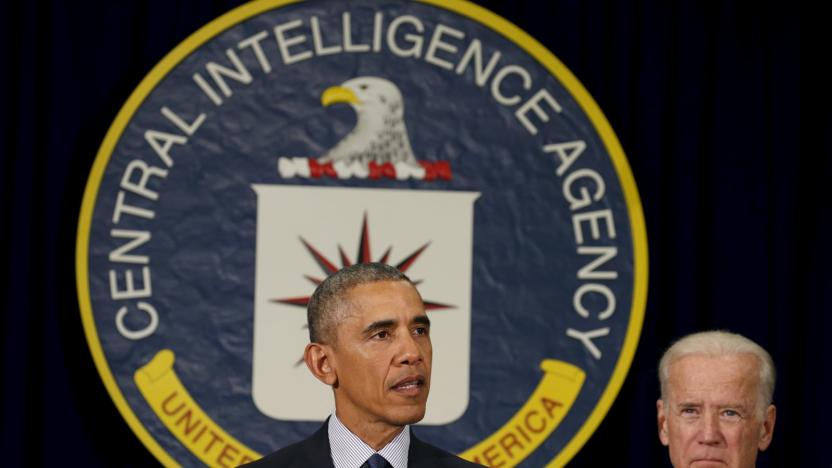
Washington Post: CIA concluded Russia intervened to help Trump
President Obama has reportedly opened an investigation into cyber attacks and foreign influence on the recent election, however, according to the Washington Post, a CIA assessment has already pointed the finger. The Post claims a CIA shared its latest report with senators in a briefing last week, telling them it was "clear" that Russia had a goal of electing Donald Trump. This differs from previous reports, where intelligence agencies said interference occurred to undermine US confidence in the election.
Richard Lawler12.09.2016
CIA reportedly plans to launch a cyberattack against Russia
The United States is preparing to launch an unprecedented cyber attack against Russia, according to NBC News. Sources told the publication that the White House asked the CIA to present it with several "clandestine" cyber operation tactics that the administration can choose from. The cyber strike's purpose? To get back at Vladimir Putin and the Kremlin for allegedly interfering with the country's elections. If you'll recall, hackers hiding behind the pseudonym Guccifer 2.0 broke into the Democratic National Convention's computers and leaked 20,000 DNC emails, personal info and donor data. The government believes Russia orchestrated the whole thing in an effort to influence the election's results.
Mariella Moon10.15.2016
CIA claims it can predict some social unrest up to 5 days ahead
Back in March 2015, the CIA chief began setting up a new office, the Directorate of Digital Innovation, to integrate the latest tech into the agency's data-gathering workflow along with boosting the country's cyber defense. According to its director, the department has helped the CIA as a whole improve its "anticipatory intelligence." Speaking at the Next Tech event yesterday, Deputy Director for Digital Innovation Andrew Hallman noted that, in some instances, they've been able to forecast social unrest and societal instability in other countries by as much as three to five days out.
David Lumb10.05.2016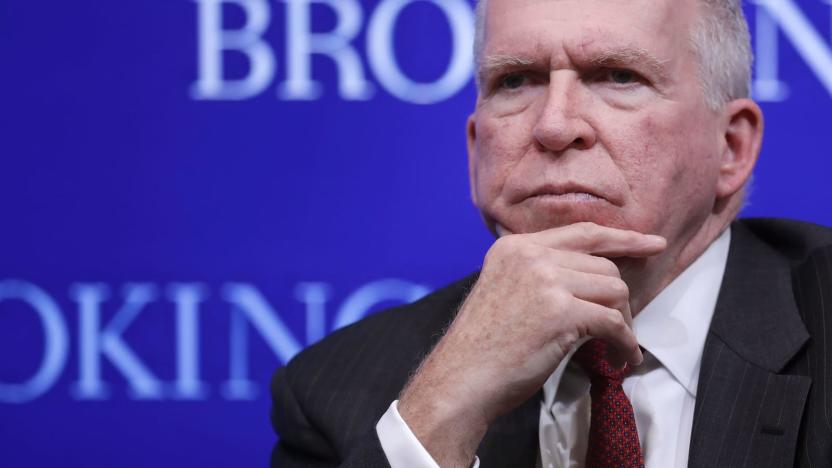
Feds arrest two men for hacking top intelligence officials
American authorities have arrested two men from North Carolina for hacking into the emails of top intelligence officials, including CIA Director John Brennan. Andrew Otto Boggs, 22, and Justin Gray Liverman, 24, are reportedly part of a hacker collective you might have heard of in the past: Crackas with Attitude. If you'll recall, UK authorities nabbed two other members back in February for the same offense. They were both teenagers, and one of them was apparently the leader codenamed Cracka.
Mariella Moon09.09.2016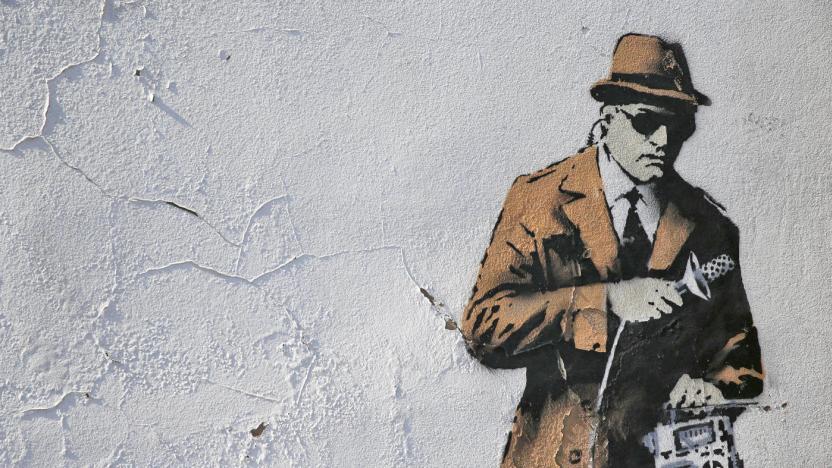
CIA and NSA doubled their searches for Americans' data in 2 years
So much for US intelligence scaling back its curiosity in the wake of Edward Snowden's leaks. An Office of the Director of National Intelligence transparency report has revealed that the CIA and NSA doubled the number of searches for the content of Americans' communications in an NSA database between 2013 and 2015. Where the two agencies made about 2,100 such requests three years ago, they searched 4,672 times last year. Just what triggered the spike isn't clear. There's a chance that some of the increase comes from repetitive searches (that is, running similar queries more than once), but they were also factors in 2013 -- the odds are that activity went up.
Jon Fingas05.04.2016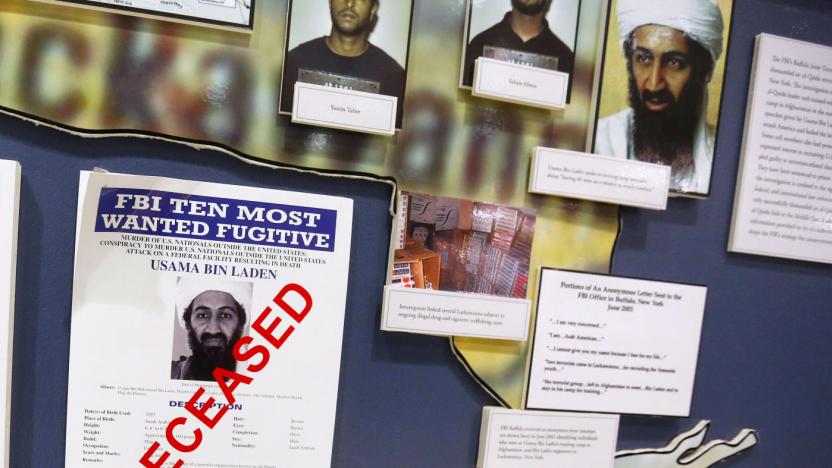
The CIA thought live-tweeting the bin Laden raid was a good idea
Tweeting a historical event as it happened can be enlightening, such as when the History Channel reenacted the sinking of the Titanic. It provides the context and time scale that you might miss reading a news story. However, the CIA just showed why this isn't always a good idea. The agency decided to recreate the raid that killed Osama Bin Laden through 'live' tweets this weekend, starting with the operation's approval and ending with confirmation of the terrorist leader's death. It was supposed to be informative, but it ended up rubbing a lot of people the wrong way... and it's not hard to see what triggered that outrage.
Jon Fingas05.02.2016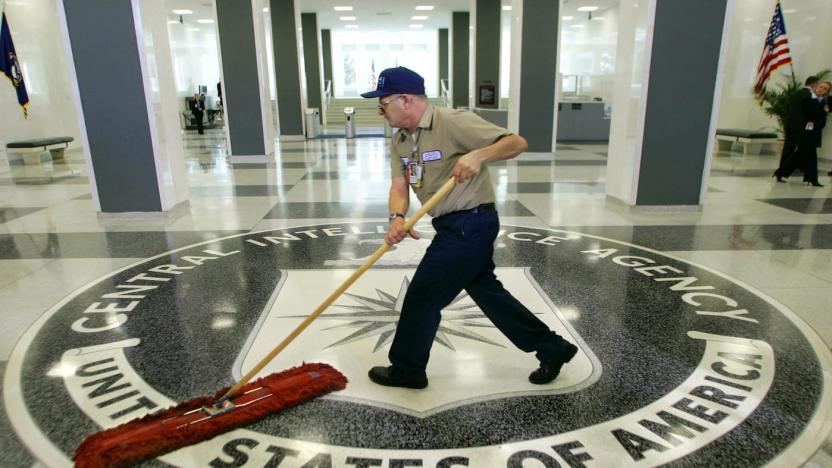
The CIA is investing in social media surveillance even more
Now that even terrorist organizations are savvy with social media, the CIA's investment arm, In-Q-Tel, is pouring more money into companies that help make sense of noisy social networks. As The Intercept reports, In-Q-Tel quietly made investments in Dataminr, a company that uses a Twitter stream to spot trends and threats for authorities; Geofeedia, which collects geotagged social posts; PATHAR, a company that directly mines social accounts for ties to terrorism and radicalization; and TransVoyant, which also monitors social networks.
Devindra Hardawar04.15.2016
UK police arrest teenager over recent US government hacks
UK authorities believe they've caught a teenage hacker who was part of the recent wave of attacks on US government officials. A 15-year-old boy who goes by the name "Cracka" was arrested earlier this week for his part in a number of security breaches. He's allegedly head of the group "Crackas with Attitude" who made news back in October for breaking into the personal email of CIA head John Brennan. The group went on to access several accounts owned by Director of National Intelligence James Clapper last month.
Billy Steele02.12.2016
The teen hackers who cracked the CIA chief's email are back
"Crackas With Attitude," the hacking group that reportedly broke into CIA chief John Brennan's personal email last October (and whose contents have since been released by Wikileaks), have once again made headlines by infiltrating a number of personal accounts owned Director of National Intelligence, James Clapper's.
Andrew Tarantola01.12.2016
Hackers have infiltrated the US arrest records database
Earlier this year, a hacking group broke into the personal email account of CIA director John Brenner and published a host of sensitive attachments that it got its hands on (yes, Brenner should not have been using his AOL email address for CIA business). Now, Wired reports the group has hit a much more sensitive and presumably secure target: a law enforcement portal that contains arrest records as well as tools for sharing info around terrorist events and active shooters. There's even a real-time chat system built in for the FBI to communicate with other law enforcement groups around the US.
Nathan Ingraham11.06.2015
WikiLeaks publishes CIA chief's pilfered email attachments
There's a reason your job wants you to use just your work email for employment-related items. It keeps your personal and career lives separate and lets your IT department lock down job-related correspondences. I'm sure the CIA has the same rules because, you know, national security. But that didn't stop director John Brennan from using an Aol email account to conduct agency business. Because Brennan is such a high profile target, this should have been expected. The government has already had trouble with leaks of employee information including info on intelligence and military personnel. Now WikiLeaks has begun publishing attachments from the breach. Today it posted six documents and intends to add more to the list in the coming days.
Roberto Baldwin10.21.2015
America's drone strike program needs a low-tech fix
Last week, The Intercept released a trove of classified documents (provided by an unnamed source) relating to America's use of unmanned aerial vehicles (UAVs) as weapons of assassination. These activities took place between 2011 and 2013, throughout both active combat areas in Iraq and Afghanistan and nations like Yemen and Pakistan. And while plenty of people are discussing the shortcomings of human-controlled UAVs, nobody's talking about how to fix them. Could the answer be more technology like the fully autonomous weapon and surveillance platforms that the Department of Defense (DoD) is developing? Or, when it comes to aerial assassinations, is less more?
Andrew Tarantola10.21.2015
High school student claims to have hacked CIA chief's personal email
The New York Post reports that an unnamed source claiming to be an American high school student has contacted the paper with evidence that he had compromised the personal email account of CIA Director John Brennan. Among the documents reportedly stored in Brennan's unsecured personal email: his 47-page application for top-secret security clearance, personal information (including SSNs) on more than a dozen top US intelligence officials and some damning emails discussing "harsh interrogation techniques" used on suspects.
Andrew Tarantola10.19.2015
Background info on US spies, military stolen by hackers
Wondering how the recently uncovered hack covering personal information from millions of government employees could be worse? We now have our answer, as sources have told the Associated Press and other outlets that in another breach, hackers accessed data from security clearance checks for military and intelligence personnel. Called Section Form 86, you can see what's covered right here (PDF). Its 127 pages cover personal data like your name and Social Security Number (and the name and SSN of the person you live with), then dive deeper into your family history, where you've lived, who you know, how regularly you drink, any loans you have, if you've ever been treated for mental illness, etc.
Richard Lawler06.12.2015
CIA shuts down program using spy satellites to track climate change
For most of the past two decades, a handful of climate change scientists have had the CIA's MEDEA (Measurement of Earth Data for Environmental Analysis) program as an ace in the hole: they could draw on classified info from spy satellites and subs to study global warming in extreme detail. However, they'll now have to make do with alternatives. The agency has shut down MEDEA, saying that its projects to study the security implications of climate change "have been completed." While the CIA says it'll still "engage external experts" on the subject, it won't be providing consistent access to its extremely accurate and rare data.
Jon Fingas05.23.2015
The CIA couldn't properly use a mass surveillance program for years
Whatever you think about the morality of using mass surveillance to catch evildoers, the technology only works if people can use it -- just ask the CIA. The New York Times has obtained a declassified report revealing that that the agency was largely kept in the dark about the President's Surveillance Program (aka Stellarwind), which allows for bulk data collection, until at least 2009. Only the highest-ranking officials could use PSP as a general rule, and those few agents that did have access often didn't know enough to use it properly, faced "competing priorities" or had other tools at their disposal. To boot, there wasn't documentation showing how effective the program was in fighting terrorism.
Jon Fingas04.25.2015